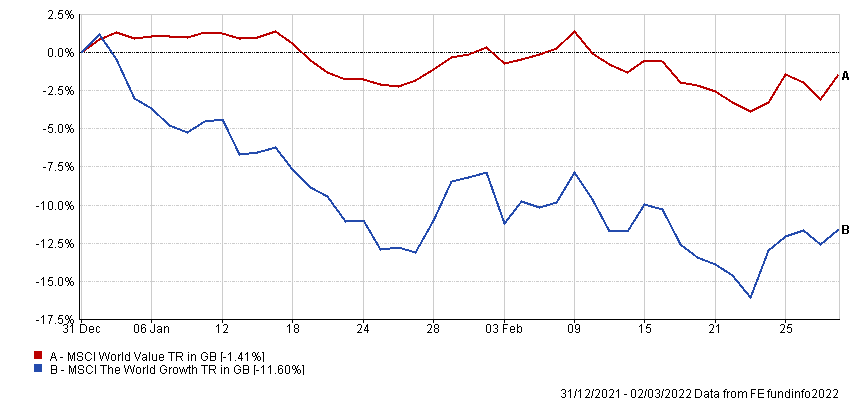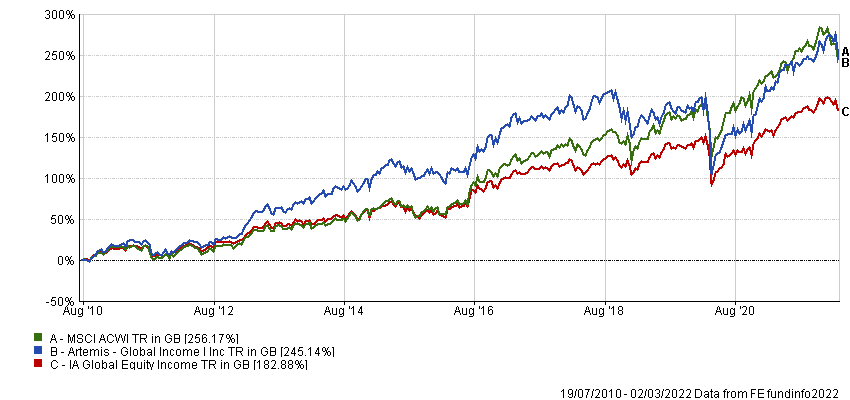Investors would be better off differentiating between short- and long-duration equities rather than growth and value ones to optimise performance against a backdrop of rising inflation, according to Jacob de Tusch-Lec, manager of the Artemis Global Income fund.
Before Russia’s invasion of Ukraine, the main talking point this year was value’s outperformance of growth after it became clear inflation wasn’t as transitory as the Fed had first claimed.
Performance of indices in 2022

Source: FE Analytics
However, de Tusch-Lec (pictured) said this is an oversimplification.
“For me, it's more about duration,” he explained. “Some growth stocks are very long duration, especially the ones that don’t have profits. That’s fine if the real interest rate is zero and the discount rate is zero, because then $1 [£0.75] today is worth $1 in 10 years.

“But where is it going to end up? If it ends at 3 to 5%, that’s absolutely critical. You may think it doesn’t matter, but over a 10-year period, that's half of the value out of the window.”
This is a view echoed by Oliver Collin, manager of the Invesco European Equity Income fund, who said that rather than splitting his portfolio into value and growth stocks, he would rather think of it in terms of the stocks that will benefit from an environment of rising yields and interest rates versus those that have benefited from the reverse over the past decade.
His fellow Invesco manager Martin Walker, who runs the group’s UK Opportunities fund, added that higher inflation and interest rates posed a more fundamental threat to long-duration stocks than simply affecting their share price multiples in the short term. He said it also affected their ability to access capital.
De Tusch-Lec agreed with him, adding: “Growth needs funding. If you’re running negative cashflows and still need capital from shareholders because you want to be a category leader and you’re gaining market share in a ‘land grab’, you’ve got to believe you can get the funding.
“Some of them will become category leaders and they’ll be fantastically profitable companies of the future. But there were too many of these companies and at one point [last year] the percentage of the S&P that was profitless was at an all-time high.
He added: “Then the market suddenly woke up and thought ‘well rates are no longer zero, the discount rate is no longer zero. The cost of capital is no longer at the same rate as before, you can't just have access to liquidity’.”
The manager contrasted the prospects of these companies with those of shorter-duration growth stocks, including many of the tech giants.
For example, he said he looked at businesses such as Microsoft “in awe”, describing them as modern infrastructure stocks and adding “no wonder they have trillion-dollar market caps”.
At the other end of the spectrum, he said he couldn’t see the value rally continuing indefinitely.
“Oil stocks are still very cheap by any standard, with the oil price over $100,” he added. “Could they continue going up? I think so. But are they going to hit the multiples that we've seen in the past? Probably not, because of the [environmental, social and governance] ESG movement and the energy transition.”
De Tusch-Lec said the price-to-earnings (P/E) dispersion in the market remained wide, pointing out that even after value’s recent outperformance, the relationship between the two is a long way from the average, with expensive stocks still very expensive, and cheap stocks still very cheap.
As an example, the manager highlighted the value opportunity in Maersk, one of the world’s largest container shipping companies. Last year, the company was expected to make $4bn of earnings before interest, tax, depreciation and amortisation (EBITDA) but it ended up making $24bn.
“It's trading on what we think is a ridiculous multiple, not because the market is stupid, because it isn't, but because there is a debate as to when the supply chain disruptions will end,” he said.
“Freight rates right now are 10 times what they are normally and this is a company that is basically printing money every day they are at these levels.
“But what is normal in a world where there's war in Europe and ships are clogging up the Suez Canal?”
The manager admitted “there is no secret sauce here”, as everyone knows the demand side of the economy is strong and supply bottlenecks have prevented people from buying the discretionary goods they desire.
Yet he warned the market continued to underestimate the scale and longevity of the problem. For example, he said about 10% of the global container shipping fleet was currently waiting outside of the port in Los Angeles because there weren't enough truckers to move their contents.
“The global supply chain is still a mess,” he continued. “A year ago, people were telling me that it would be fine by the end of 2021, and then at the beginning of this year people were telling me we'd be fine by now.
“For a company making six times what it should do in a normal world, every day matters. The market is pricing in normalisation, but it's just not happening.”
Data from FE Analytics shows Artemis Global Income has made 245.1% since launch in July 2010, compared with gains of 256.2% from its MSCI ACWI benchmark and 182.9% from its IA Global Equity Income sector.
Performance of fund since launch vs sector and index

Source: FE Analytics
The £1.3bn fund has ongoing charges of 0.87% and is yielding 2.7%.






